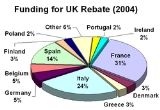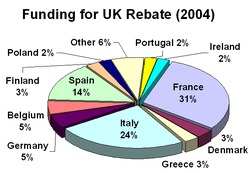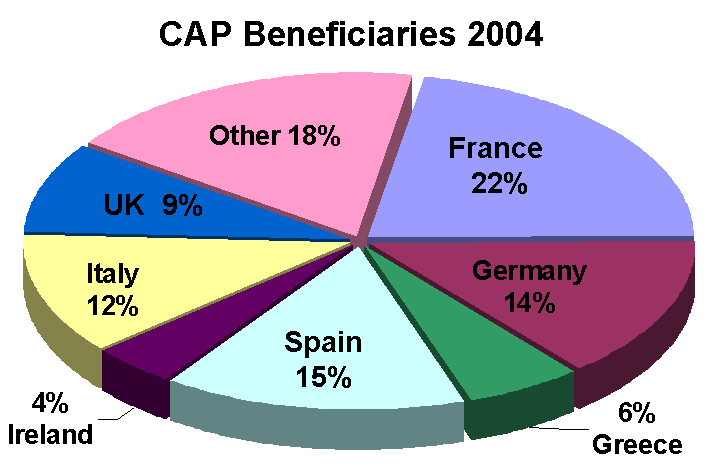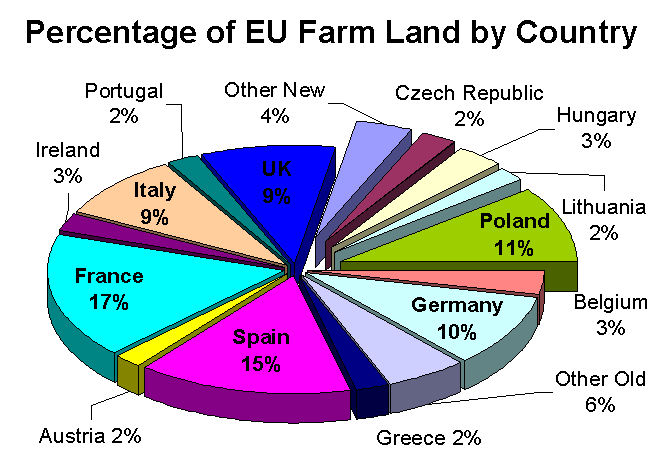
UK rebate
Encyclopedia
The UK rebate is a rebate on the United Kingdom
's contribution to the EU budget
paid back to the UK government by the European Union
.
 The rebate was negotiated by UK Prime Minister
The rebate was negotiated by UK Prime Minister
Margaret Thatcher
in 1984. The main reason for the rebate was that a high proportion of the EU budget (at that time 80%, now approximately 41% ) is spent on the Common Agricultural Policy
(or CAP), which benefits the UK much less than other countries as it has a relatively small farming sector as a proportion of GDP. Payments to the EU are largely funded by VAT returns and are roughly proportionate to the size of the economy. The rebate was also sanctioned because, at the time, the UK was the third poorest member of the 10 European Economic Community
members (now the European Union
).
The rebate is calculated as approximately 2/3 of the amount by which UK payments into the EU exceed EU expenditure returning to the UK. the rebate is worth £5bn (GBP) a year and the UK remains one of the largest net contributors. The method of calculating the rebate is complex, but its effect is to increase contributions required from all other member states, to make up the loss from the overall budget. Germany, the Netherlands, Sweden and Austria all have their contribution to make up for the rebate capped to 25% of the figure which would otherwise apply, leaving France to make up for the main part of the increase in what Britain would pay without the rebate. Final calculations of the rebate are only made four years after the budget year in question.
, for the rebate to be scrapped. This is partly because the recent additional member states of the EU, which are considerably poorer than the 15 pre-2004 states, will be a considerable expense on the CAP and the EU budget in general. The view is put forward by many that this makes the UK rebate harder to accommodate within the EU budget, leveraged with the moral argument that all the new entrants are substantially poorer than the UK. The new entrants, however, are likely to be net recipients of EU funds and not net contributors like the UK and only Germany will make a larger contribution to these poorer entrants.
The rebate distorts UK funding negotiations with the EU. Normally, countries and independent agencies within each country bid to receive central EU funds. The UK government is aware that 2/3 of any EU funding will in effect be deducted from the rebate and come out of UK government funds. Thus the UK has only a 1/3 incentive to apply for EU funds. Other countries, whose contributions into the budget are not affected by funds they receive back, have no incentive to moderate their requests for funds.
Furthermore, many EU grants are conditional on the recipient finding a proportion of funding from local sources, frequently national or local government. This increases the proportion coming from UK government revenue even further. This has the effect of artificially reducing EU expenditure returning to the UK and worsening the deficit which the rebate is intended to redress.
 The British government has resisted campaigns to abolish the rebate and the UK has a veto
The British government has resisted campaigns to abolish the rebate and the UK has a veto
on any decision by the EU to do so, a veto which the proposed European Constitution would not affect. Former Prime Minister Tony Blair
said that he would veto any attempt to scrap the rebate. He was supported by many in his Cabinet
and by the main opposition party, the Conservatives
, as well as the majority of the British public. Supporters of the rebate argue that the distortion created by the rebate is minor compared to that created by the Common Agricultural Policy, which is expensive and has implications for free
and fair trade
in the EU. In addition, they point out that without the rebate, the UK would pay much more into the EU than comparably wealthy countries like France, due to structural differences between their economies.
, France gets more than twice as much CAP funds than the UK (22% of total funds compared to the UK's 9% - see diagram) which in cash terms is a net benefit that France gets over and above what the UK gets from the CAP of €6.37bn. In comparison, the UK budget rebate for 2005 is scheduled to be approx €5.5bn. Agricultural expenditure for new member states is included in the 'other' segment of the graph. This was limited in 2004 to 25% of payment rates applying to existing member states, rising to 30% in 2005 and 100% in 2013. Total CAP expenditure is capped, so in the absence of further changes, payments to all the pre-2004 member countries will fall by 5% over this period. Some commentators claim that to a large extent, France gets twice the CAP payment received by the UK because it has twice the amount of farmland, although the extent to which there is a correlation between the two is disputed.
 A popular view in the UK is that if the UK rebate were reduced with no change to the CAP, then the UK would be paying money to keep an inefficient French farming sector in business - to many British people, such an injustice would be seen to be grossly unfair. However, this argument ignores that France remains a net payer to the EU budget.
A popular view in the UK is that if the UK rebate were reduced with no change to the CAP, then the UK would be paying money to keep an inefficient French farming sector in business - to many British people, such an injustice would be seen to be grossly unfair. However, this argument ignores that France remains a net payer to the EU budget.
If the rebate were removed without changes to the CAP then the UK would pay a net contribution of 14 times that of the French (In 2005 EU budget terms). The UK would make a net contribution of €8.25bn compared to the current contribution of €2.75bn, versus a current French net contribution of €0.59bn. The UK has a slightly lower GDP than France, see List of countries by GDP (nominal), its per capita is also lower. Germany has a GDP approximately 25% higher than either France or the UK, but per capita income is comparable to the other two countries. France technically makes a net payment into the EU budget, though much less than either the UK or Germany. However, France is the greatest contributor towards the UK rebate, due to the complex funding formula used, which means it would benefit most from its abolition. If France were not required to contribute towards the rebate, then it would be a net recipient of EU funds, despite being one of the wealthiest countries.
These contrasting positions led to deadlock at the June 2005 EU budget negotiations in Brussels
. France and other states demanded the abolition of the UK rebate at this meeting. Britain dismissed this as a diplomatic
manoeuvre by France to save face after their rejection of the European Constitution
in a referendum two weeks before the meeting. The UK made CAP reform a prerequisite of removal of the rebate, a proposal their opponents rejected. The negotiations thus ended without an agreement being reached. In December 2005 the UK Prime Minister Tony Blair agreed to give up approximately 20% of the rebate for the period 2007-2013, on condition that the funds did not contribute to CAP payments, were matched by contributions from other countries and were only for the new member states. Spending on the CAP remained fixed, as had previously been agreed. Overall, this reduced the proportion of the budget spent on the CAP. It was agreed that the European Commission should conduct a full review of all EU spending.
United Kingdom
The United Kingdom of Great Britain and Northern IrelandIn the United Kingdom and Dependencies, other languages have been officially recognised as legitimate autochthonous languages under the European Charter for Regional or Minority Languages...
's contribution to the EU budget
European Union Budget
The European Union is a union of 27 member states. The Administration of the Union has a parliament, a civil service and a judiciary that is distinct from those of the member states. These arms administer the application of treaties, laws and agreements between the member states and their...
paid back to the UK government by the European Union
European Union
The European Union is an economic and political union of 27 independent member states which are located primarily in Europe. The EU traces its origins from the European Coal and Steel Community and the European Economic Community , formed by six countries in 1958...
.
History

Prime Minister of the United Kingdom
The Prime Minister of the United Kingdom of Great Britain and Northern Ireland is the Head of Her Majesty's Government in the United Kingdom. The Prime Minister and Cabinet are collectively accountable for their policies and actions to the Sovereign, to Parliament, to their political party and...
Margaret Thatcher
Margaret Thatcher
Margaret Hilda Thatcher, Baroness Thatcher, was Prime Minister of the United Kingdom from 1979 to 1990...
in 1984. The main reason for the rebate was that a high proportion of the EU budget (at that time 80%, now approximately 41% ) is spent on the Common Agricultural Policy
Common Agricultural Policy
The Common Agricultural Policy is a system of European Union agricultural subsidies and programmes. It represents 48% of the EU's budget, €49.8 billion in 2006 ....
(or CAP), which benefits the UK much less than other countries as it has a relatively small farming sector as a proportion of GDP. Payments to the EU are largely funded by VAT returns and are roughly proportionate to the size of the economy. The rebate was also sanctioned because, at the time, the UK was the third poorest member of the 10 European Economic Community
European Economic Community
The European Economic Community The European Economic Community (EEC) The European Economic Community (EEC) (also known as the Common Market in the English-speaking world, renamed the European Community (EC) in 1993The information in this article primarily covers the EEC's time as an independent...
members (now the European Union
European Union
The European Union is an economic and political union of 27 independent member states which are located primarily in Europe. The EU traces its origins from the European Coal and Steel Community and the European Economic Community , formed by six countries in 1958...
).
The rebate is calculated as approximately 2/3 of the amount by which UK payments into the EU exceed EU expenditure returning to the UK. the rebate is worth £5bn (GBP) a year and the UK remains one of the largest net contributors. The method of calculating the rebate is complex, but its effect is to increase contributions required from all other member states, to make up the loss from the overall budget. Germany, the Netherlands, Sweden and Austria all have their contribution to make up for the rebate capped to 25% of the figure which would otherwise apply, leaving France to make up for the main part of the increase in what Britain would pay without the rebate. Final calculations of the rebate are only made four years after the budget year in question.
Pressure for change
There has been growing pressure in recent years from various EU member states, including FranceFrance
The French Republic , The French Republic , The French Republic , (commonly known as France , is a unitary semi-presidential republic in Western Europe with several overseas territories and islands located on other continents and in the Indian, Pacific, and Atlantic oceans. Metropolitan France...
, for the rebate to be scrapped. This is partly because the recent additional member states of the EU, which are considerably poorer than the 15 pre-2004 states, will be a considerable expense on the CAP and the EU budget in general. The view is put forward by many that this makes the UK rebate harder to accommodate within the EU budget, leveraged with the moral argument that all the new entrants are substantially poorer than the UK. The new entrants, however, are likely to be net recipients of EU funds and not net contributors like the UK and only Germany will make a larger contribution to these poorer entrants.
The rebate distorts UK funding negotiations with the EU. Normally, countries and independent agencies within each country bid to receive central EU funds. The UK government is aware that 2/3 of any EU funding will in effect be deducted from the rebate and come out of UK government funds. Thus the UK has only a 1/3 incentive to apply for EU funds. Other countries, whose contributions into the budget are not affected by funds they receive back, have no incentive to moderate their requests for funds.
Furthermore, many EU grants are conditional on the recipient finding a proportion of funding from local sources, frequently national or local government. This increases the proportion coming from UK government revenue even further. This has the effect of artificially reducing EU expenditure returning to the UK and worsening the deficit which the rebate is intended to redress.

Veto
A veto, Latin for "I forbid", is the power of an officer of the state to unilaterally stop an official action, especially enactment of a piece of legislation...
on any decision by the EU to do so, a veto which the proposed European Constitution would not affect. Former Prime Minister Tony Blair
Tony Blair
Anthony Charles Lynton Blair is a former British Labour Party politician who served as the Prime Minister of the United Kingdom from 2 May 1997 to 27 June 2007. He was the Member of Parliament for Sedgefield from 1983 to 2007 and Leader of the Labour Party from 1994 to 2007...
said that he would veto any attempt to scrap the rebate. He was supported by many in his Cabinet
Cabinet of the United Kingdom
The Cabinet of the United Kingdom is the collective decision-making body of Her Majesty's Government in the United Kingdom, composed of the Prime Minister and some 22 Cabinet Ministers, the most senior of the government ministers....
and by the main opposition party, the Conservatives
Conservative Party (UK)
The Conservative Party, formally the Conservative and Unionist Party, is a centre-right political party in the United Kingdom that adheres to the philosophies of conservatism and British unionism. It is the largest political party in the UK, and is currently the largest single party in the House...
, as well as the majority of the British public. Supporters of the rebate argue that the distortion created by the rebate is minor compared to that created by the Common Agricultural Policy, which is expensive and has implications for free
Free trade
Under a free trade policy, prices emerge from supply and demand, and are the sole determinant of resource allocation. 'Free' trade differs from other forms of trade policy where the allocation of goods and services among trading countries are determined by price strategies that may differ from...
and fair trade
Fair trade
Fair trade is an organized social movement and market-based approach that aims to help producers in developing countries make better trading conditions and promote sustainability. The movement advocates the payment of a higher price to producers as well as higher social and environmental standards...
in the EU. In addition, they point out that without the rebate, the UK would pay much more into the EU than comparably wealthy countries like France, due to structural differences between their economies.
, France gets more than twice as much CAP funds than the UK (22% of total funds compared to the UK's 9% - see diagram) which in cash terms is a net benefit that France gets over and above what the UK gets from the CAP of €6.37bn. In comparison, the UK budget rebate for 2005 is scheduled to be approx €5.5bn. Agricultural expenditure for new member states is included in the 'other' segment of the graph. This was limited in 2004 to 25% of payment rates applying to existing member states, rising to 30% in 2005 and 100% in 2013. Total CAP expenditure is capped, so in the absence of further changes, payments to all the pre-2004 member countries will fall by 5% over this period. Some commentators claim that to a large extent, France gets twice the CAP payment received by the UK because it has twice the amount of farmland, although the extent to which there is a correlation between the two is disputed.

If the rebate were removed without changes to the CAP then the UK would pay a net contribution of 14 times that of the French (In 2005 EU budget terms). The UK would make a net contribution of €8.25bn compared to the current contribution of €2.75bn, versus a current French net contribution of €0.59bn. The UK has a slightly lower GDP than France, see List of countries by GDP (nominal), its per capita is also lower. Germany has a GDP approximately 25% higher than either France or the UK, but per capita income is comparable to the other two countries. France technically makes a net payment into the EU budget, though much less than either the UK or Germany. However, France is the greatest contributor towards the UK rebate, due to the complex funding formula used, which means it would benefit most from its abolition. If France were not required to contribute towards the rebate, then it would be a net recipient of EU funds, despite being one of the wealthiest countries.
These contrasting positions led to deadlock at the June 2005 EU budget negotiations in Brussels
Brussels
Brussels , officially the Brussels Region or Brussels-Capital Region , is the capital of Belgium and the de facto capital of the European Union...
. France and other states demanded the abolition of the UK rebate at this meeting. Britain dismissed this as a diplomatic
Diplomacy
Diplomacy is the art and practice of conducting negotiations between representatives of groups or states...
manoeuvre by France to save face after their rejection of the European Constitution
French referendum on the European Constitution
The French referendum on the Treaty establishing a Constitution for Europe was held on 29 May 2005 to decide whether France should ratify the proposed Constitution of the European Union...
in a referendum two weeks before the meeting. The UK made CAP reform a prerequisite of removal of the rebate, a proposal their opponents rejected. The negotiations thus ended without an agreement being reached. In December 2005 the UK Prime Minister Tony Blair agreed to give up approximately 20% of the rebate for the period 2007-2013, on condition that the funds did not contribute to CAP payments, were matched by contributions from other countries and were only for the new member states. Spending on the CAP remained fixed, as had previously been agreed. Overall, this reduced the proportion of the budget spent on the CAP. It was agreed that the European Commission should conduct a full review of all EU spending.
See also
- Economy of the European UnionEconomy of the European UnionThe economy of the European Union generates a GDP of over €12,279.033 billion according to the International Monetary Fund , making it the largest economy in the world...
- Economy of the United KingdomEconomy of the United KingdomThe economy of the United Kingdom is the sixth-largest national economy in the world measured by nominal GDP and seventh-largest measured by purchasing power parity , and the third-largest in Europe measured by nominal GDP and second-largest measured by PPP...
- Sapir Report - a 2003 European Commission sponsored report recommending the transfer of EU expenditure toward wealth creation and cohesion, and away from the CAP.

